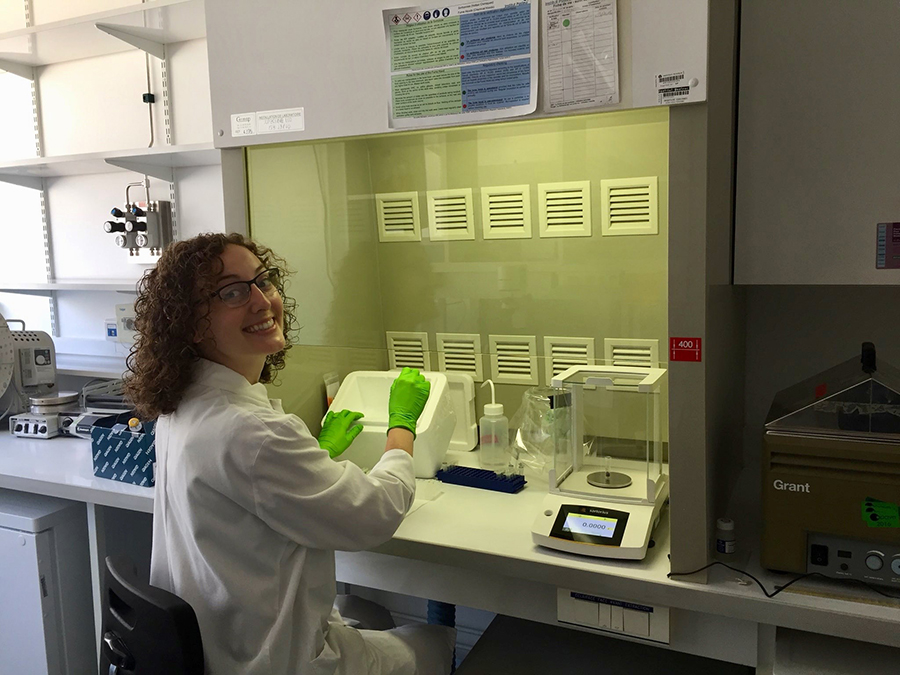
Northwest alumna Courtney Thomas, pictured in a microbial cell lab at Institut Pasteur as she extracted DNA from animal fecal samples, is a scientific writer. She completed a Ph.D. in microbiology at the Institut Pasteur in Paris. (Submitted photo)
The foundational profession-based experiences she gained as an undergraduate student at Northwest Missouri State University have helped alumna Courtney Thomas advance her education and furthered her passion for biological sciences.
Thomas, a 2015 Northwest alumna, now is a scientific writer and recently completed a Ph.D. in microbiology at the Institut Pasteur in Paris.
“Courtney was always an outstanding student and a great person,” Dr. James Campbell, a Northwest associate professor of biology, said. “We were able to attract her to Northwest as one of our Distinguished Scholars in the marine biology program, and she has certainly lived up to that title. We are all really proud of her accomplishments, and it is inspirational for current students to see a Bearcat go on to do great things.”
In 2012, Thomas arrived at Northwest to obtain a bachelor’s degree in marine biology. As a student in Campbell’s general microbiology course, she found an interest in the science of microbes.
“I got more interested in marine microbes and how the microbes interact with larger eukaryotic organisms,” Thomas said. “So because of that I started working in Dr. Campbell’s lab for a semester, and he encouraged me to apply for graduate school.”
Thomas, who went on to obtain a master’s degree in marine sciences from the University of Georgia, attributes her success to the Northwest faculty and people with whom she collaborated in the Department of Natural Sciences and Marine Biology Society. She found a supportive community at Northwest.
Additionally, she served as president of the Marine Biology Society, taught as a general biology supplementary instructor and worked as a microbiology tutor at the Student Success Center.
“Being a tutor and working as a supplemental instructor were important because I got a very strong foundation at Northwest with learning how to study and allocate my time,” Thomas said. “Those types of things are really crucial for any type of work in science.”
The Department of Natural Sciences also offers a summer program that allows marine biology majors to study at the University of Southern Mississippi’s Gulf Coast Research Laboratory. There, Thomas took marine biology courses, networked with Southern Mississippi’s faculty and conducted field-based projects that provided an invaluable professional experience.
“The summer program that marine biology students do in Mississippi is fantastic, and that was a transformative experience for me because it was the first time that I was living and studying very far away from home,” Thomas said. “It taught me about time management, organization and living as an adult for the first time.”
In December, Thomas defended her dissertation at the Institut Pasteur. She now works as a scientific writer for Integrated DNA Technologies, where she writes to educate scientists and non-scientists about the company’s tools and devices.
“When I got my bachelor’s degree, I was super proud, but now I’m like, ‘Well, I got my Ph.D.,’” Thomas said. “My family is super proud, but it’s strange to hear when people say ‘Dr. Thomas.’ I’m like ‘Who are you talking to?’ So, it’s something I’m working on processing.”
Thomas relocated to Paris at the end of her master’s program at the University of Georgia. She secured a position at the Institut Pasteur as a research engineer for six months and was encouraged to apply for a Ph.D. grant by her advisors.
“Institut Pasteur was attractive to me because it was in a city I wanted to live in, they spoke English, were doing amazing research, and were willing to hire me,” Thomas said.
Thomas studied 250 animal species’ fecal samples to investigate the lifestyle of methane-producing archaea living in the animal’s intestine. Her study aimed to understand microbes’ evolutionary trends and adaptive abilities to live in the animals.
“The thing we overlook often is microbes rule the world,” Thomas said. “They’re responsible for many things in everyday our everyday life and play an important role in our health and states of disease. We have this human-centric approach to life when in reality there is so much, biologically speaking, that we can’t see that are foundational blocks of our lives. I think that’s fascinating.”